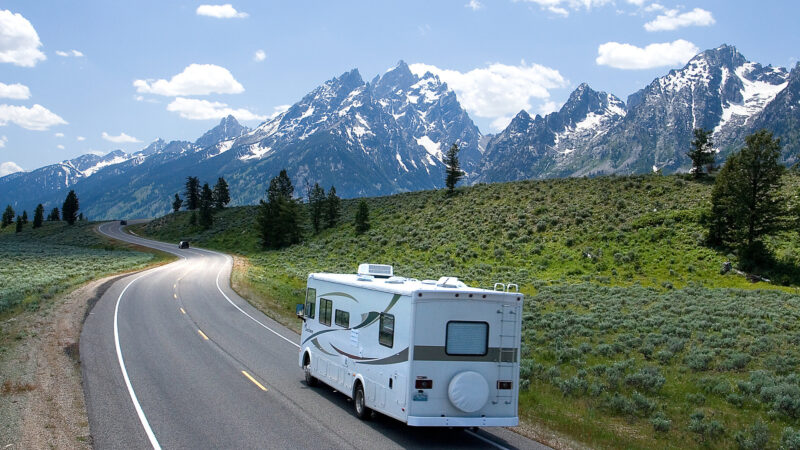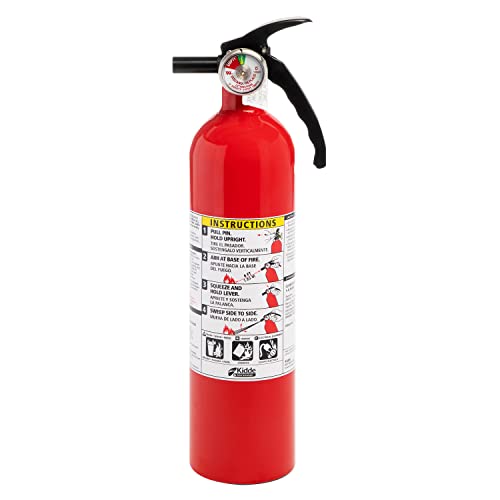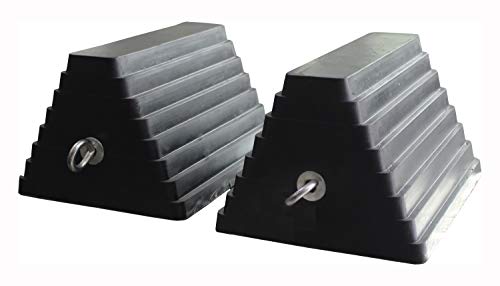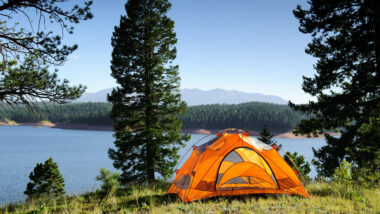Table of Contents Show
If you’ve considered purchasing an RV but have worried about safety, you’re in good company. Without a proper understanding of RV basics and a few essential safety features, these recreational vehicles could be dangerous.
But, thankfully, most of them come equipped with certain products that protect us as we enjoy this lifestyle. You can purchase a few others to make your camping experience even safer. So let’s dive in!
Is RVing Dangerous?
RVing can be dangerous. If you drive 75 miles per hour on the interstate in an RV, you’re driving recklessly. These 40,000-pound motorhomes or 20,000-pound fifth wheels aren’t designed to travel at such speeds.
RVs are heavier, longer, and broader than your standard vehicle, so we must drive carefully and understand safe driving habits.
Additionally, once you set up at a campsite, you could put yourself in potential danger if you don’t understand a few things. For example, propane can be dangerous if you don’t handle it properly.
Propane is an important fuel for RVing. RV refrigerators, stoves, water heaters, and furnaces use propane. But if your tank leaks or you smell a strong odor from your stove, this could be potentially dangerous.
However, RVing, in general, isn’t dangerous. As long as you take proper precautions, like driving at an appropriate speed and having a carbon monoxide detector, RVing isn’t any more hazardous than any other outdoor activity.
Of course, it comes with inherent risks, but you can also take preventative measures.
11 Important Safety Essentials for RVing
Once you’ve purchased your RV, you probably feel ready to hit the road and enjoy a weekend camping trip.
But before you do, there are some important safety items you’ll want to ensure you have. These could be the difference between life and death.
1. Fire Extinguisher
Every new RV should come with a fire extinguisher. However, you may want to add a second one depending on the size of your rig. Know where it is located and how to use it. The majority of RVs have wood frames and interiors, so when they catch on fire, it’s quick. Be prepared with a fire extinguisher.
- Use to fight basic fires common to the home involving trash, wood, paper (Class A), flammable liquids and gases (Class...
- Tough, aluminum valve assembly & easy to pull safety pin
2. Fire Alarm
Like a fire extinguisher, another important safety feature of most new RVs is the fire alarm. Depending on your rig’s size, you may have a few of them.
Always replace the batteries regularly and add this to your maintenance checklist. RVs burn quickly; you’ll need all the warning you can get to exit in time.

3. Carbon Monoxide Detector
Because of the regular use of propane in RVs, you should also have a carbon monoxide detector placed about four inches from the floor, usually near the kitchen, since this deadly gas is heavier than air.
Should you have a propane leak or have fumes from a generator leak into your RV, this detector will save your life. It’s hard-wired into your RV’s electrical system and not battery-operated, so you don’t have to change these batteries.
- Double-duty alarm detects both gas leaks and co gas simultaneously
- Reliable 12v power means no missing or dead batteries to replace
4. Water Leak Detector
This product is something you’ll have to purchase separately. It won’t come standard on an RV. These round discs work great for basement storage and sink cabinets where leaks may occur.
If you have a drip, the detector will alert you with an alarm. Since RV plumbing goes underneath the RV, having a few of these water leak detectors in places you don’t regularly check is a good idea.
- Note: As the WS01 operates independently and does not feature Wi-Fi connectivity, it is not compatible with the SWS54...
- Real-Time Monitoring of Water Leaks and Floods: 4 bottom sensor probes and 2 top sensor probes to detect water leaks and...
5. Gas Stop
As already mentioned, propane can be dangerous. You need to have a gas stop. This product immediately shuts off the propane in case of a major leak. This won’t come standard, but it’s a vital safety product to add to your must-have list.
- 100% PROTECTION - GasStop is a must-have safety device that protects families with RVs that have propane systems on...
- CONVENIENT PRESSURE INDICATOR - Effortlessly monitor pressure levels in your propane tank to prevent gas runouts when...
6. Weight Distribution Hitch
If towing a travel trailer, you must reduce sway and have as much control over the trailer as possible. A weight distribution hitch helps you maintain control as you travel and provides a safer, smoother ride.
Curt, Camco, and Andersen are all well-known brands in the RV industry that make these hitches. This is one of the more expensive safety features, but you’ll be glad you have one when a gust of wind blows, or a semi-truck passes you on the interstate.
- INTEGRATED SWAY CONTROL — The TruTrack doesn't just level the vehicle and trailer. It also reduces trailer sway. It...
- PRECISE WEIGHT DISTRIBUTION — The TruTrack weight distribution hitch with sway control offers precise levelling of...
7. Tire Pressure Monitoring System
Although many RVers don’t have a tire pressure monitoring system (TPMS), we highly recommend one. These systems help alert you should the tire pressure rapidly decrease or increase.
This device can help you pull over quickly enough to avoid a tire blowout. Tire blow-outs can cause severe damage to your rig and ruin a camping trip. A TPMS is another more expensive item but worth it for peace of mind and protection.
- Package Dimensions: 23.368 H x 7.366 L x 18.542 W (centimetres)
- Monitors up to four different vehicles
8. Trailer Brake Controller
If you have a large towing capacity, like a heavy-duty truck, your vehicle will come with a trailer brake controller. However, if you tow with an older model or smaller car, you may not have a trailer brake controller installed.
It’s important to apply brakes to your trailer from the tow vehicle. Otherwise, your tow truck is responsible for stopping or slowing the trailer all by itself. This can be dangerous and illegal in some states.
9. Surge Protector
To protect your RV’s electrical system, you’ll need a surge protector. Should a power surge occur, this device will protect your electrical system from getting fried or possibly starting a fire.
When you arrive at a campsite, this is the first thing you plug into the power pedestal. It checks the power quality and continues to monitor it while you’re connected. You can find them for 30 amp and 50 amp plugs, so ensure you buy the correct one.
- Maintain electronic safety - This 50 Amp RV Surge Protector by Progressive Industries is a real guard for your RV...
- Prevents costly damage - With a 50A/120-240V/12,000W rating, SSP-50XL can absorb surges of up to 1,650 joules. This...
10. Wheel Chocks
No matter how level a campsite may seem, always chock your wheels. Buy a good rubber set of wheel chocks, not plastic ones, that you’ll have to replace soon.
These rubber stoppers prevent your RV from going forward or backward. So before you disconnect your tow vehicle and start leveling, chock your wheels.
- Generous Dimensions: With dimensions of approximately 10 inches in length, 8 inches in width, and 6 inches in height,...
- Heavy-Duty Rubber Construction: Crafted from durable rubber, these wheel chocks are engineered to withstand loads and...

11. NOAA Emergency Weather Radio
Finally, RVing in severe weather is dangerous. Protect yourself by having an NOAA emergency weather radio on hand. Tornadoes can form within minutes, flash flooding can happen without warning, and intense winds can occur anywhere in the country.
Because weather varies across the country and even within states, you might find yourself in a region with unfamiliar weather patterns. Be prepared and alert no matter where you travel with a weather radio.
- [2000MAH POWER BANK WILL KEEP DEVICES POWERED] FosPower's emergency radio incorporates a 2000mAh power bank capable of...
- [3 POWER SOURCES POWER WHEN YOU NEED IT] Use the emergency weather radio's 3 power sources when you need a boost of...
Do I Need a Security System for My RV?
One item we didn’t put on this list is a security system. Many RVers will say that a security system is a must-have for traveling.
You might want to invest in a security system if you’re gone for long periods during the day or night. It would ruin a great day of hiking to return to find someone has broken into your RV.
The problem with security systems is their need for connectivity. Some RVers don’t have unlimited access to the internet.
Unless you have Starlink running 24/7 at the campsite, a security system may do you no good. But you may want to install a video camera to monitor your RV and campsite.
How Do I Keep My Pet Safe in My RV?
Another important safety feature to consider is a pet monitoring system. Although we didn’t put this on our list, RVers who travel with pets will explain how important it is to keep them safe.
Waggle is a popular brand that manufactures a pet monitoring system for RVs. It requires a monthly subscription, but pet owners will say it’s worth the investment. This system monitors the temperature and humidity and immediately alerts you about significant changes.
- ◆SUBSCRIPTION REQUIRED◆: Waggle Pet Monitor Cannot Be Used Without A Subscription. The Subscription is for Cellular...
- INSTANT ALERTS ON YOUR PHONE: Get Alerted - Not Alarmed. Keeping An Eye On Your Dog’s Safety Is Now Easy With Waggle....
You’ll also receive alerts of power outages, which is important if you leave your pet in an air-conditioned RV in the middle of summer. Temperatures can rise quickly as soon as the A/C turns off, putting your pet at risk.
Protect Yourself This Camping Season With These Important Safety Features
Enjoy the beauty of nature this camping season, savor the family memories, and tell stories around the campfire. With these features in place, you can sit back, relax, and enjoy the experience.
But don’t delay in prepping your RV for these important items. You don’t want a blissful afternoon to turn into a catastrophic tragedy.
Do you need to add any of these safety features to your camping gear?
Last update on 2024-07-25 / Affiliate links / Images from Amazon Product Advertising API
















